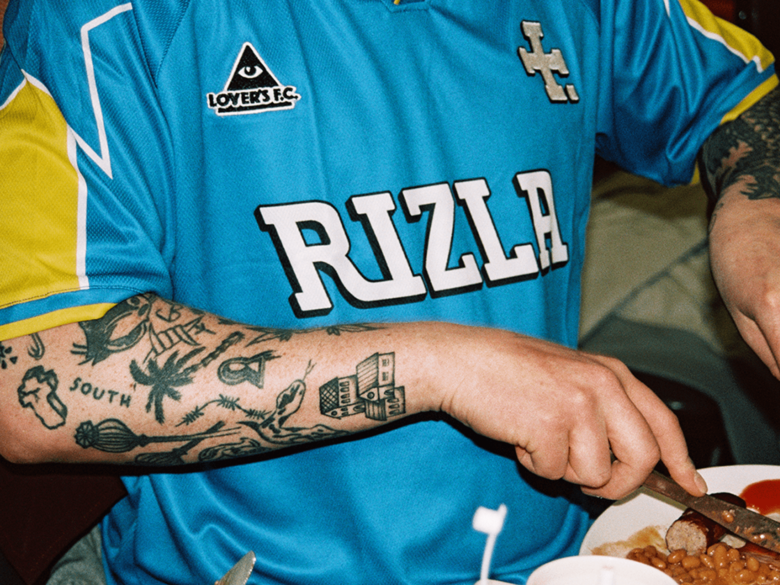The hypocrisy of accepting the rhythm and ignoring the blues
Society loves seeing Black people succeed to new heights. We all celebrated Michael Jordan on his numerous NBA championships (and we all bought a pair of his Air Jordans when they were released). We all watched Beyonce’s Homecoming documentary and collectively realised that she’s basically super-human. We all celebrated Rihanna when she partnered with LVMH, making Fenty a luxury fashion house complete with a Paris showroom.
But when Colin Kaepernick took the knee for the American national anthem, he is suddenly just another Black person and no longer a treasured NFL player. From that point on he never plays again, just for taking an outward stance in defence of Black life. Similarly, when Munroe Bergdorf speaks out against white supremacy and racism in 2017, she is dropped as the face of L’Oréal. Whilst the brand has since apologised, at the time we could all hear their message loud and clear: “Munroe is the perfect face for L’Oréal but only if she keeps her mouth shut about the things that really matter, like protecting Black people.”
There’s no doubt that Black culture — or more specifically the capital gain industries can harness from “Blackness” — is palatable and appealing to our white counterparts. But, in cruel juxtaposition to this, violence against Black bodies is widely accepted. Black culture has always been invaluable to society whilst Black lives are seen as disposable, but how can this be? How can wider society accept the rhythm, Black peoples’ massive cultural contribution, without acknowledging the blues, their ongoing struggle for equality and the disproportionate deaths they face at the hands of the police? To put it bluntly, Black culture has always been seen as invaluable in society whilst Black lives are seen as disposable.
Recognising the blues is uncomfortable for the majority because to do so white people would have to look within themselves, check their own privilege and realise that the systems they benefit from often hurt Black communities irrevocably. To hear the blues is to acknowledge the constant eradication of the Black community. To look at the blues you have to recognise generations of systemic violence and prejudice at the hands of those in power — all of which is painful and uncomfortable.
But if you’re a white person reading this and are uncomfortable, imagine how much more uncomfortable it is to be experiencing these instances of prejudice, violence and loss first hand. It is a painful and uncomfortable conversation because it is direct action against white privilege and white fragility. Frankly, it easier to be distracted by the rhythm because it is something we can all take joy in collectively. It is much more enjoyable to listen to a song by Travis Scott or buy a Fenty Beauty lipstick than to look at the deeper social ills within society. And what’s even more distracting is white privilege, which allows you to pick and choose when you pay attention to racial injustice, safe in the knowledge that you won’t be personally affected.
This ignorance of the blues leads to irreversible harm to the Black community. A very stark reminder of this is the continued and needless deaths of so many Black people at the hands of the police. There are, tragically, too many to include here but they include Breonna Taylor, who was shot eight times while sleeping in her home, George Floyd, who was choked publicly to death with a knee on his neck, and Ahmaud Arbery, who shot while jogging near his home. Maybe the reason Black people feel like they need to excel to new heights is that it might allow them to be seen as equal to their white counterparts. Or maybe, more importantly, this success is what keeps them valuable, untouchable and therefore alive.
In popular culture, sport can level the playing field literally between Black people and white people. Way back in 1963, the Trinidadian sociologist C.L.R. James wrote Beyond a Boundary, a book arguing that the cricket pitch temporarily suspends race and class inequalities. Unlike in real life, all players, whether they be British or West Indian, follow the same rules within the game. Moreover, the West Indian teams would often beat the British, quite literally at their own game. James summarises this all superbly, writing that in the game “all men in the island were equal; and we were the best men on the island”. The cricket pitch was not only a place that Black mean could prove their equality, it was also a place where they could surpass the white players.
Popular culture has often been a stage where performances of equality could be exercised and tolerated by white onlookers. As James so painfully put it, on the sports field, if nowhere else, “all men were equal”. But with the recent Black Lives Matter protests ricocheting all around the world from Palestine to Japan, from Kenya to Italy, it is heartening to know that the narrative is changing — people do not want the rhythm without the blues. People are no longer accepting half-baked performances of equality, they want the genuine, real thing.
All around the world, people are taking a stand against injustices affecting Black communities, flooding bail funds for BLM protestors with donations and finally educating themselves on anti-racism. Most have now realised the huge hypocrisy involved in celebrating the rhythm without acknowledging the blues. They are no longer willing to accept the boundless fruits which Black culture provides without dealing with the stark reality how those fruits were made.
You cannot listen to a hip-hop song, without considering the police brutality that is facing young Black men and women everyday. Or buy from Black-owned beauty brands, without realising the stark under representation of Black faces within the make up industry. You cannot accept the rhythm without also simultaneously acknowledging the blues. Lest we forget the dark origin of rhythm and blues; this great genre came about because slaves would sing to pass the time whilst tending to the cotton and vegetable fields.
My message is this: if you have previously been an advocate for Black culture but not for Black lives, just know that this mode of thinking is not only rife with hypocrisy but a risk to our lives. It is equal to performative allyship, as useful as the endless, banal black squares posted for #blackouttuesday without any further action. To be a useful ally in this fight, you must accept Black people as humans not just as cultural commodities. We are not your commodities, you can’t use us up and then throw us away when you think we are done being “valuable”.
Lastly, remember that there is no rhythm without the blues — both have to come together beautifully, through centuries of processing the pain and trauma of being oppressed; and both are part of the story for so many Black people all around the world.

